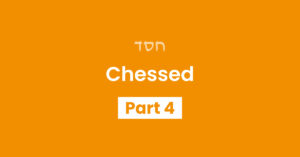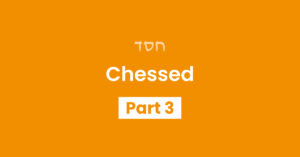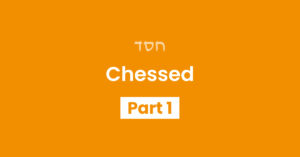Last week, we explained that doing chessed is not just about “being a nice guy.” Whenever we do a chessed, we are actually emulating Hashem, because Hashem does chessed all day long. The more we emulate Hashem by doing chessed, the more similar – and closer – we will become to Him, thereby fulfilling the purpose of our creation.
There are endless ways to do chessed – smiling at another person, lending a helping hand, or giving money to those in need. If we want to emulate Hashem’s chessed, what is the best way to do it? What form of chessed is most similar to Hashem’s chessed?
If we want to emulate Hashem’s chessed, what is the best way to do it?
The answer perhaps lies in understanding the phrase “Chessed Shel Emes – True Kindness.”
What is “Chessed Shel Emes”? Many times in the Torah, “Chessed Shel Emes” refers to burying a dead body. For example, when Yaakov Avinu realized the end of his life was near, he called to his son Yosef and asked him to do “Chessed V’Emes – kindness and truth” by promising to bury his body in Israel (instead of in Egypt).1
Why is burying the dead considered “true chessed”? Rashi2 explains that the person burying the dead does not expect to get anything in return. The dead person can never repay him for the kindness he did. The purest form of kindness is when you do chessed just for the sake of giving or helping another person, without expecting anything in return.
The person burying the dead does not expect to get anything in return.
Sometimes, when we do acts of kindness for others, we really have ulterior motives deep down. Instead of being motivated by a true desire to give, we sometimes have an element of “taking” mixed in, too.
For example: Your neighbor asks if you have a few eggs to spare, because she’s in the middle of a recipe and just ran out of eggs. You graciously agree – partly because you’d like to help her out, but also partly because you’d like to feel like she is indebted to you, so that next time you run out of an ingredient yourself, she will be more likely to lend it to you. If you give her the eggs now, she will be more likely to be generous toward you in the future. So when you give her the eggs, part of you wants to give, but part of you wants to take.
Having mixed motivations when you give to other people is very normal and fine. But if we want to develop the our middah of chessed in the most pure way, then we need to sometimes practice giving – just for the sake of giving.
This is the meaning of “Chessed Shel Emes – True Kindness.” The purest form of chessed is when you give just for the sake of giving – without expecting to get anything back.
The purest form of chessed is when you give just for the sake of giving – without expecting to get anything back.
The Shelah HaKadosh3 writes that if we do chessed because we are expecting any sort of payback, then we are really like a merchant who sells goods in exchange for money. But if we want to be true givers, we need to do chessed without expecting anything back in return.
Emulating Hashem
Giving just for the sake of giving is really the highest form of emulating Hashem. As we explained last week, Hashem created this entire world in order to give us pleasure. Hashem doesn’t need to take anything back from us – Hashem wants to give, just for the sake of giving.
Hashem doesn’t need to take anything back from us – Hashem wants to give, just for the sake of giving.
So in order to emulate Hashem – who gives purely for the sake of giving – we, too, can strive to give just for the sale of giving, without expecting any payback.
But how can we do that? We often have mixed feelings when we give… part of us wants to give, but part of us is also hoping to gain some benefit in return. How can we practice giving in a way that is purely motivated by a desire to give?
Hidden Chessed
One way to develop a truly giving nature is to practice doing hidden acts of kindness.
One way to develop a truly giving nature is to practice doing hidden acts of kindness.
If your wash all the dishes and then tell your mother/spouse what you did, they will feel gratitude and indebted to you for your kindness. But if you’re walking on the street and pick a piece of litter off the floor – no one will know about your kind deed. The recipients of your kindness – i.e. the other people walking on the street – wont know about your chessed, and therefore wont even realize to pay you back for it. Doing hidden acts of kindness like this will be doing chessed in a way that does not result in payback. this is the purest form of chessed and this is how we practice being true Givers.
When we do chessed in a hidden way, we are showing that we are purely interested in doing good for the recipient; we are not doing it in order to receive payback.
When we do chessed in a hidden way, we are showing that we are purely interested in doing good for the recipient;
(In fact, doing 1 hidden act of kindness each day is one of R’ Avigdor Miller’s famous “10 Steps to Greatness.” Rav Avigdor Miller writes that no one other than Hashem should know about what you did.)
This week, let’s practice doing hidden acts of chessed to experience what it means to be a true Giver like Hashem.
Sources: [1] Bereishis 47:29; [2] Rashi, ibid.; [3] Shelah HaKadosh, Vol II. Vayechi pg. 69
Your Challenge
Once a day, do a hidden act of kindness.
No one other than Hashem should know about what you did.
FOR EXAMPLE:
- Pick a piece of garbage off the floor or street.
- Tidy up your house or take out the garbage.
- Wash some dishes.
- Fix something on a shelf in a store.
- Give tzedakah.
- Daven for something that another person needs. (Davening for other people is a huge chessed, and a very effective way to help them!)
- Put an extra umbrella somewhere with a sign saying that anyone can use it if they’re stuck.
- Notice what someone needs and leave it by their door, desk, or cabinet.
- Drop off money by someone who needs it.
- Donate your old shoes or clothing to the poor.
- Hang up an inspirational quote somehwere where other people will see it.
- Send an anonymous card, letter, or email to someone, telling them how much their hard work is appreciated.
Torah Questions
- When did Avraham do chessed for someone who didn’t even need it? (See Bereishis 18:8)
- How did Hashem reward Avraham’s descendants (the Jewish people) for his acts of kindness? Give at least 2 answers. (See Vayikra Rabbah 34:8 or Bava Metzia 86b)
- What kal vechomer does the Midrash learn from here? (See Vayikra Rabbah 34:8)
- Fill in the blanks: Pirkei Avos 1:2 says that the world stands on 3 things: ____, ____, and acts of kindness.
- The Midrash (Vayikra Rabbah 34:8) says there was someone in the Torah who did a chessed for someone else whom he was anyway obligated to repay. Who was supposed to repay a kindness to whom? (See Shemos Chapter 2)
Questions to Ponder
- What do you think it means to be a “true giver”?
- When you do acts of kindness, do you ever feel like you have other motivations mixed in with your desire to give?
- As we explained this week, one way to practice being a true giver is to do hidden acts of chessed. Can you think of any other ways to practice giving in a more pure way?
- The Yalkut Shimoni says that Hashem repays our acts of chessed forever, but repays acts of tzedakah only for up to 3 generations. Why? What do you think is the difference between tzedakah and chessed?
- The Yalkut Shimoni says that anyone who does chessed is as if he demonstrates his belief in all the miracles that Hashem ever did… and anyone who does not do chessed, is as if he doesn’t believe in Hashem at all. Why do you think that is true?
- The Talmud Yerushalmi says that rain comes to this world in the merit of 3 things: Chessed, the earth, and the hardships that we endure. Why do you think our chessed has an impact on the rain? Why would our chessed have an more of an impact on rain levels than any other mitzvos we do (like keeping Shabbos)?




